1954: Alcatraz – Review
by Edward
|
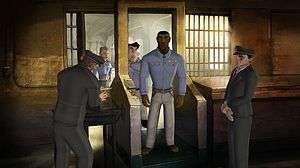 It’s a hard-knock life for us self-purported game journalists. Instead of treated, we get trolled. Instead of kisses, we get our favourite games repeatedly delayed and then people troll us some more. Case in point; I’ve been in love with an upcoming point-and-click called 1954: Alcatraz since Gamescom 2012. I say “in love”, but this essentially extended to remembering it, getting really excited, hurriedly checking online to see if there was any sign of it being released any time soon and then longingly gazing out of a window while something wistful played in the background.
It’s a hard-knock life for us self-purported game journalists. Instead of treated, we get trolled. Instead of kisses, we get our favourite games repeatedly delayed and then people troll us some more. Case in point; I’ve been in love with an upcoming point-and-click called 1954: Alcatraz since Gamescom 2012. I say “in love”, but this essentially extended to remembering it, getting really excited, hurriedly checking online to see if there was any sign of it being released any time soon and then longingly gazing out of a window while something wistful played in the background.
During last year’s E3 I fell in love all over again; I crowned it as one of my games of the show, pestered creator Gene Mocsy until he gave me an interview (and subsequent restraining order), and reignited that love all over again. At this point, Daedalic shouldn’t have been surprised if I suddenly appeared outside one of their windows with a boom-box. My biggest problem was that, despite the lengthy development time, there didn’t appear to be a release in sight. My situation became a weird opposite to that of the inmates of the time – they would give anything to get out, while I was desperate to get in. Eventually, parole was granted, and I finally managed to start hatching my escape plans.
For the uninitiated, 1954: Alcatraz is the story of a couple named Christine and Joe, the former a member of the San Francisco Beat scene, the latter a man locked up in the historically infamous prison. Like all convicts locked up on the island, Joe has been plotting his escape to freedom and the waiting arms of his wife. Back in the day, he and Mickey the mobster performed an armed robbery, although it was widely believed that the money from the heist was burnt up in the ensuing fracas and police confrontation. Mickey got away scot-free while Joe was incarcerated, only to break out, get caught again, and moved to the inescapable Alcatraz.
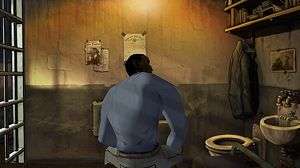 Well, allegedly inescapable, as our story begins when our playable prisoner decides that he’s finally going to leave the island once and for all and start a new life with his beloved Christine. However, she’s being threatened by his former partner Mickey, who has since learned that not all of the money had disappeared, with most of that fortune stashed away somewhere in San Francisco. Players will thus need to switch between Joe’s life on Alcatraz as he plots his departure, and Christine’s as she searches for the hidden cash to achieve their goal of a brand new life elsewhere.
Well, allegedly inescapable, as our story begins when our playable prisoner decides that he’s finally going to leave the island once and for all and start a new life with his beloved Christine. However, she’s being threatened by his former partner Mickey, who has since learned that not all of the money had disappeared, with most of that fortune stashed away somewhere in San Francisco. Players will thus need to switch between Joe’s life on Alcatraz as he plots his departure, and Christine’s as she searches for the hidden cash to achieve their goal of a brand new life elsewhere.
At least, that’s one way the story could play out. One of the reasons that 1954: Alcatraz garnered so much of my initial attention was because that was only one of the potential outcomes your characters could aim for. Whispers are abound that Joe wasn’t exactly faithful to Christine before his incarceration, and players can choose to investigate this and discover what happens when they pull on that particular story-thread. Perhaps Christine could find the money and leave her husband rotting in prison? Maybe Joe had been unfaithful, and the player could decide whether to forgive him or not? What if he was innocent?
 |
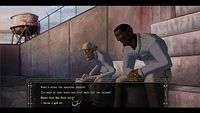 |
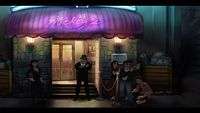 |
 |
 |
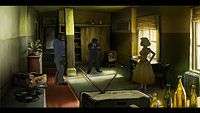 |
Such questions whirl in the mind, and it’s up to the player whether they want Christine to pull on those threads or not. It seems that due to her status as a free-thinking, intelligent and prominent member of the beat scene, she’s forever being chased around by potential suitors. One such example is Detective Grassi, a racist, homophobic and overall nasty piece of work, whose amorous advances betray the fact that he may have made a special effort to get Joe locked up in the first place. Then there’s Dale, an ex-boyfriend who lurks outside Christine’s apartment window, follows her around and won’t take no for an answer to his suggestion they run away together, despite both parties being married to other people. Finally, there’s Mickey, the man threatening to end the lives of our happy couple if he doesn’t get his hands on the missing loot.
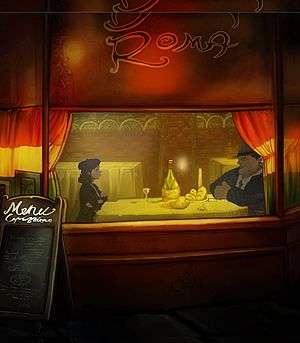 What’s equally interesting is that you can choose how Christine wants to treat them in return. Do you accept a dinner date with the detective? Will you flirt with Mickey so he thinks you’re on his side? Should you let Dale in for “coffee”? How you deal with them is up to you, although there are ramifications if you decide to start playing away. Conversely, Joe has significantly less temptation to deal with, save for the presence of transgender prisoner Chiquita.
What’s equally interesting is that you can choose how Christine wants to treat them in return. Do you accept a dinner date with the detective? Will you flirt with Mickey so he thinks you’re on his side? Should you let Dale in for “coffee”? How you deal with them is up to you, although there are ramifications if you decide to start playing away. Conversely, Joe has significantly less temptation to deal with, save for the presence of transgender prisoner Chiquita.
Thanks to this premise, 1954: Alcatraz is immediately able to differentiate itself from the bulk of other point-and-click titles out there. Not only is there a clear morality system – something the genre wholly lacks save for the rare occasion where you can choose between one of two endings – but it’s not necessarily reflective of how you treat everyone around you. Instead, it’s wholly dependant on how you value the marriage between Joe and Christine. Different paths emerge in the story and the ending can be completely altered by whether you want our star-crossed lovers to stay together, with certain choices locked out depending on your martial status.
The impact of such a mechanic is slightly diminished by the fact that there’s no evident measure of where the characters currently stand, although it’d be jarring to see a meter rise or fall depending on your actions. This is also mitigated by the fact that some of the negative choices are well signposted, so you’d have to deliberately go out of your way to enact them. However, there are only about three or four moments throughout the entire story where you’re given said options, so it’s a feature that simultaneously provides a unique twist on the morality meter but has a slightly vague impact and feels under-utilised.
Conversely, the ability to swap between Joe and Christine on the fly is one that doesn’t feel over-used or gimmicky in the slightest. Changing perspectives is as simple as going to your inventory and clicking on the profile of the character you want to play as. That being said, there are moments throughout the story where your choice will be made for you, putting you in the shoes of the other side of the relationship until certain conditions are met.
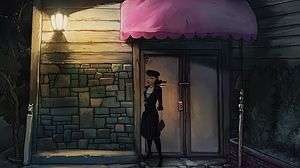 Other circumstances will conspire to allow you to swap items or clues between the couple via a proxy, although you’ll have to work hard to reach this point. This idea is actually quite ingenious in its application, but it does raise a massive question of exactly how time progresses on each side of the story. The entirety of Christine’s story takes place during nightfall, but Joe’s story takes place during the day. Joe’s end-game sections also take place under the cover of night at roughly the same time as his wife’s shenanigans.
Other circumstances will conspire to allow you to swap items or clues between the couple via a proxy, although you’ll have to work hard to reach this point. This idea is actually quite ingenious in its application, but it does raise a massive question of exactly how time progresses on each side of the story. The entirety of Christine’s story takes place during nightfall, but Joe’s story takes place during the day. Joe’s end-game sections also take place under the cover of night at roughly the same time as his wife’s shenanigans.
The insinuation is that the action takes place over a single day, but the inter-character puzzles would only be possible over a series of days, with the story never being explicitly stating who is doing what when. It feels like those parts of the story were inserted in retrospect, with little thought to how it affected the flow or logic of the world. It’s by no means a game-breaker, but thinking about it for more than a few seconds can threaten to break Alcatraz’s internal reality and mar what is an otherwise excellent story.
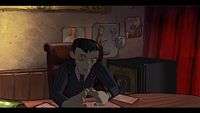 |
 |
 |
 |
 |
 |
Something else that helps separate 1954: Alcatraz from its pointy-clicky brethren is that it has quite a bit more freedom than you’d expect. Several puzzles allow for multiple solutions, situations will play out completely differently depending on how you use your silver tongue, and there are even side-quests. Granted, they’re not overly extensive, but they do act as a reward for daring to go beyond the regular confines of the story. Want to find out if Joe really was unfaithful, or enact revenge on Mickey by getting him in trouble with the mob? You’re more than free to, if you so wish.
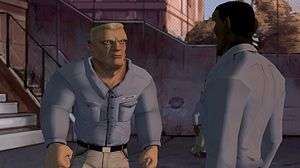 That being said, there is a weird dichotomy between restriction and experimentation, and that’s no more evident than it is in the opening moments. During the opening conversation between Joe and Christine, there used to be a choice between whether you wanted to call on a favour from another inmate or simply cut their phone wire while they were distracted. While I’d been shown that latter option at E3, along with a telling hint that it might come back to haunt you, the final product only allows you to enact the first choice, while the wire-cutting no longer available.
That being said, there is a weird dichotomy between restriction and experimentation, and that’s no more evident than it is in the opening moments. During the opening conversation between Joe and Christine, there used to be a choice between whether you wanted to call on a favour from another inmate or simply cut their phone wire while they were distracted. While I’d been shown that latter option at E3, along with a telling hint that it might come back to haunt you, the final product only allows you to enact the first choice, while the wire-cutting no longer available.
Similarly, when you’re in the canteen a scene earlier, there are unique sequences that play out if you try and murder anyone at the table, complete with a funeral scene and custom dialogue. However, if you try and do anything like that afterwards then Joe will just outright refuse to do so. It’s understandable why those choices aren’t accommodated later on, but it feels equally weird that despite the litany of choices you’re given in the opening moments you’re given surprisingly few later on.
By no means does this mean that 1954: Alcatraz is linear; various puzzles come with multiple solutions, alternative paths to take and the order in which you tackle the tasks at hand is mostly left up to your own jurisdiction. At times it truly feels like San Francisco is your oyster, but this can leave you to come a little unstuck and running around each location if you’re struggling to remember what you need to do next or unsure of where you need to go.
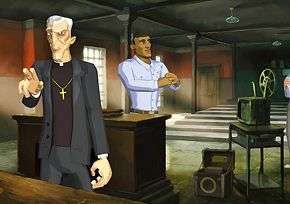 Those with multiple solutions aside, the puzzles on display are mostly inoffensive. There are several moments where you’ll find yourself stumped for a few minutes, but the majority of these won’t lead to any frustration, as our heroes will give hints if you’re stumped for too long. Those hints range from pointing you in the right direction to outright telling you what you need to do, but not how to do it. It’s a good – if slightly inexact – application that doesn’t spoil your enjoyment by letting you get stuck for too long, but some might not like having the solution occasionally spelt out to them. In any case, it saves you have to use everything on everyone until you stumble upon the right answer.
Those with multiple solutions aside, the puzzles on display are mostly inoffensive. There are several moments where you’ll find yourself stumped for a few minutes, but the majority of these won’t lead to any frustration, as our heroes will give hints if you’re stumped for too long. Those hints range from pointing you in the right direction to outright telling you what you need to do, but not how to do it. It’s a good – if slightly inexact – application that doesn’t spoil your enjoyment by letting you get stuck for too long, but some might not like having the solution occasionally spelt out to them. In any case, it saves you have to use everything on everyone until you stumble upon the right answer.
For the most part, these puzzles are well-balanced and if you do find yourself unable to go on, then it’s usually a case of having to explore the various locales some more; one chain didn’t begin until I’d re-visited an area I’d been to previously, although it did essentially feel like luck as there was no real hint given that the character I needed to talk to would show up at that point or explanation provided as to why they would appear there.
The roster of people you meet is more colourful than you’d expect from a title set in the fifties, but what’s more pleasant to discover is that with the exception of one of the Asian characters nobody seems to be written in a stereotyped or exploitative way. Even the exception isn’t written poorly, just voiced in a way that makes her sound like a bad impression of an old Asian lady.
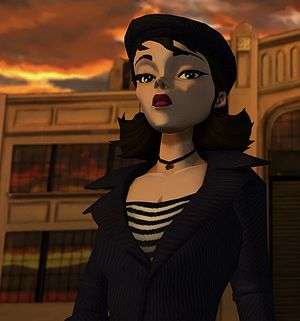 Although the rest of the cast members weren’t written to be stereotypes or stock characters, they can come across as this at times. There’s a wide range of characters to choose from, but your interactions are often limited and the impression is often given that they were initially more prevalent than they are now. As a result some of the personalities with the most potential end up feeling underdeveloped rather than nuanced.
Although the rest of the cast members weren’t written to be stereotypes or stock characters, they can come across as this at times. There’s a wide range of characters to choose from, but your interactions are often limited and the impression is often given that they were initially more prevalent than they are now. As a result some of the personalities with the most potential end up feeling underdeveloped rather than nuanced.
One of Christine’s tasks involves her helping a gay couple get back together, but the puzzle thread is short enough that they can be summed up as “fickle with camp voices”. The prison’s inmates include a transgender by the name of Chiquita, but outside of a puzzle where you fish her lingerie out of a washing machine and another where you give her fashion magazines, your only other interaction is an optional one in the form of prison sex. Granted, there’s a dark moment involving her later on, but it’s a blink-and-you’ll-miss-it moment where she’s nowhere to be seen.
I don’t think there was a single person who I didn’t like in terms of their promise and potential, but I was left wanting for them all to have a much bigger presence. There were some fantastic characters waiting in the wings, and while I’m glad they weren’t shoehorned in for the sake of it, I do wish that they’d had more screen-time to fulfil their full potential.
Meanwhile, the soundtrack does a great job of reflecting the time period, with some wonderful jazz numbers and an incredible opening theme that you can hear being reprised every time you enter Mickey’s Club. However, apart from that one song there aren’t any other memorable numbers. They’re all well-composed and suit the ensuing action near-perfectly, but you won’t be whistling them once the credits roll. As for the art style, it’s a neat combination of two and three dimensions; characters are rendered in the latter while everything else looks like it was drawn in the former. Character animations are a bit wonky at times, but it’s not too distracting, and if you feel the game is too colourful and could stand to be a bit more monochrome, then you can activate “1954 Mode” in the options and play through the entire story as seen through an olde-timey filter. It’s not the typical look that you would expect from Daedalic, but therein also lies its charm, as this fits the events more naturally than if they were all drawn and animated in a similar manner to say, the Deponia series.
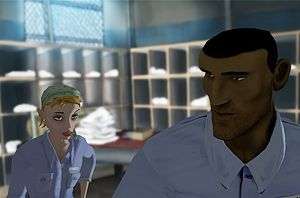 One way 1954: Alcatraz could stand to take a lesson from that series, however, is in terms of pacing. The writing feels more intelligent and isn’t clamouring to make jokes all of the time, but it almost feels like Alcatraz could stand to be a bit more contemplative. It’s hard to accurately gauge, but there are definitely moments where everything goes by slightly faster than it really needs to, a scene goes by before you know it or a character’s potential dialogue options deplete before you’re really getting to know them. There are times when you want to stand still and soak in the sights while the game wants to stride ahead and starts looking a bit impatient that you’re not keeping up.
One way 1954: Alcatraz could stand to take a lesson from that series, however, is in terms of pacing. The writing feels more intelligent and isn’t clamouring to make jokes all of the time, but it almost feels like Alcatraz could stand to be a bit more contemplative. It’s hard to accurately gauge, but there are definitely moments where everything goes by slightly faster than it really needs to, a scene goes by before you know it or a character’s potential dialogue options deplete before you’re really getting to know them. There are times when you want to stand still and soak in the sights while the game wants to stride ahead and starts looking a bit impatient that you’re not keeping up.
This was especially odd to me considering that I managed to get to the end credits in around four and a half hours. Admittedly, I had already played the first half of the story in a preview build and thus knew most of the solutions and skipped a fair chunk of the early dialogue, so the running time is more likely to be about six hours for those tackling 1954: Alcatraz for the first time.
 |
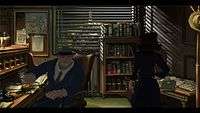 |
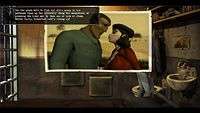 |
 |
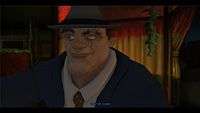 |
 |
That play-time can be extended thanks to the side-quests and achievements on offer, although some are tied to which ending you chose, meaning that you’ll have to play through again if you want to be a completionist. Otherwise, the achievements are mostly linked to experimenting with the world around you and trying ideas you may not necessarily have thought of. Even though these will up the clock on your total time played, it’s not as if it necessarily comes across as a short adventure. I was genuinely surprised by the number Steam gave me, as it actually felt a lot longer than that. Rushed, yes, but not to a degree where it was unsatisfactory.
 When I last wrote about it, I claimed that 1954: Alcatraz “could genuinely prove to be one of the greatest adventure games of the last decade”. The reality has turned out to be different, but not to a degree where Daedalic’s newest effort is a disappointment. The premise is still fascinating, it’s a point-and-click that approaches moral choices in a completely different manner to everything else out there, encourages freedom and exploration for the most part, and comes with a wide, ecletic roster of characters, even if they’re underused and threaten to become stereotypical.
When I last wrote about it, I claimed that 1954: Alcatraz “could genuinely prove to be one of the greatest adventure games of the last decade”. The reality has turned out to be different, but not to a degree where Daedalic’s newest effort is a disappointment. The premise is still fascinating, it’s a point-and-click that approaches moral choices in a completely different manner to everything else out there, encourages freedom and exploration for the most part, and comes with a wide, ecletic roster of characters, even if they’re underused and threaten to become stereotypical.
Even when those talking points come with their own flaws, it’s still significant that 1954: Alcatraz dares to do as much as it has. It may have threatened to do a whole lot more at one point in development, but there’s no denying that a lot of what this game does or attempts to do is noteworthy, even if not all of it is pulled off as well as it could have been. It may have its issues, but these are far fewer in number than you’d think, and what’s left is one of the most interesting and unique point-and-click titles I’ve ever played. For anyone who has ever been curious about the genre, or thought that it had nothing left to offer, this is for you.
Pros- A great story that takes great advantage of its brilliant premise.
- A morality system tied into the protagonists' relationship to each other, rather than whether they've made binary good or bad choices.
- Doesn't outlast its welcome and leaves the player wanting more.
- Multiple solutions to some puzzles rewards experimentation.
- Progression is less linear than genre counterparts, giving the player more freedom and encouraging exploration.
- Puzzles are challenging while remaining inoffensive and are unlikely to leave you frustrated.
- A ecletic cast, including a number of LGBT characters...
- ...However, they're not given enough screen-time and can come off as stereotypical as a result.
- Character-swapping can lead to some apparent time-travelling paradoxes.
- Can occasionally be unclear what you need to do next.
- Music is well-fitting, but unmemorable.
- Some odd animation choices.
- Might be too short for some, especially considering the pacing can come off as rushed at times.
1954: Alcatraz is a wholly unique point-and-click with a brilliant premise that's only let down by the fact that it arguably never reaches its full potential. It may be darker, shorter and more serious than what you'd expect from the genre, but it's also more inventive, innovative and shows that there's plenty of life and new directions the genre can be taken in without losing its soul. For that alone, it deserves to be applauded. Gene Mocsy and Daedalic should be proud, as this is easily one of the most intriguing point-and-clicks around. If you think I'm wrong, then feel free to chuck me in Alcatraz yourself.
Last five articles by Edward
- Best of 2015: Journey's End: A New Beginning
- Journey's End: A New Beginning
- You Can't Choose Your Happy Ending
- Okay, Let's Fix Comedy In Games - The V-Effekt
- Time Keeps On Smashing Away



















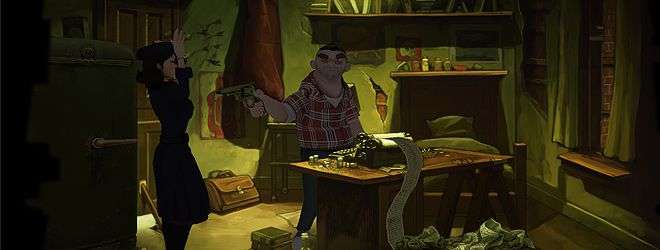
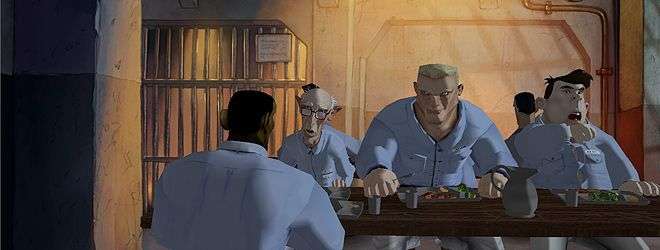
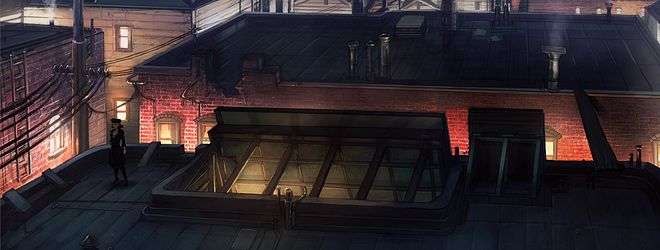
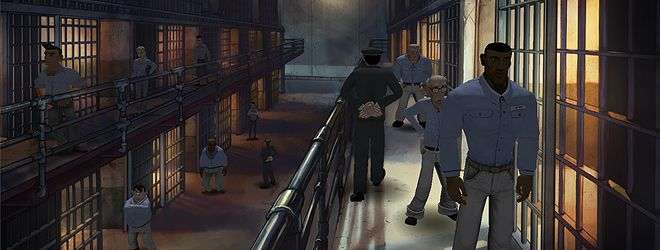






I’m seriously thinking of getting this game after this review.
I Love Daedalic, and adventure p’n’c games!
I’m a bit worried that it won’t be worth the money if it is as you say about the length of the game Edward, but even if it is short (i.e 1-5 hours of gaming), i doubt I would mind since i have played some short gems before over the 15+ years ive been a geek lol